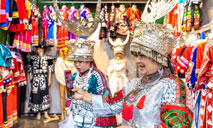Commentary: Britain's troubling racism over war dead only tip of iceberg
LONDON, April 26 (Xinhua) -- They fought for the same British Empire alongside their white counterparts during World War I. Yet tens of thousands of African and Asian troops who perished during the fighting have barely been commemorated - or not at all - while their white counterparts received headstones.
Those soldiers, who died fighting for Britain, went largely unremembered simply because of their race.
According to a report from the Commonwealth War Graves Commission, which is tasked with commemorating those who died in the two world wars, between 45,000 and 54,000 named casualties are or were in some way deliberately treated differently to those killed in Europe.
In addition, it is estimated that at least 116,000, but potentially as many as 350,000, casualties may not be commemorated by name or may not be commemorated at all, primarily across East Africa and Egypt.
The reason behind the inequality is the "entrenched prejudices, preconceptions and pervasive racism of contemporary imperial attitudes."
According to the report, there were cases where the commission "deliberately overlooked evidence" that would have allowed it to find the names of the dead. A governor of a British colony said in 1923 that "The average native ... would not understand or appreciate a headstone."
The British government on Thursday apologized for failures to properly commemorate black and Asian troops who died in World War I fighting for the British Empire.
But London's apology is far from enough and long overdue given the gravity of their sacrifice.
The colonies and dominions of the British Empire had paid a substantial price to bring about Britain's victory during World War I. Enormous amounts of money and human lives were lost in securing it. It is fair to estimate that well over 3 million British colonial and dominion subjects served, and that potentially upwards of 500,000 perished.
Britian's legacy of racism lives on today, with deep-seated and persistent inequality experienced by African descendants in such areas as health care, education, employment, housing, law enforcement and criminal justice. Black children have far fewer opportunities for schooling than white children, while black people are four times more likely to be arrested than white people.
Unfortunately, a recent British government-backed report tried to deny the existence of institutional racism, calling Britain "a model" for white-majority countries regarding racial equality in education and the workplace.
Last Monday, a group of UN human rights experts condemned the report, saying it further distorted and falsified historical facts, and could even fuel further racism.
"The report's conclusion that racism is either a product of the imagination of people of African descent or of discrete, individualized incidents ignores the pervasive role that the social construction of race was designed to play in society, particularly in normalizing atrocity, in which the British state and institutions played a significant role," the statement said.
The UN experts added that it is "stunning" to read such a report in the year 2021.
"This attempt to normalize white supremacy despite considerable research and evidence of institutional racism is an unfortunate sidestepping of the opportunity to acknowledge the atrocities of the past and the contributions of all in order to move forward," the statement said.
Labour MP David Lammy, who was critical to bringing the war dead issue to light, said: "Whilst we can't change the past, we can make amends and take action."
Compared with granting the dead with the dignity they deserve, ensuring the rights of the living is no less important. The British government has much to do to live up to its commitment to defend human rights and set an example for the world community.
Photos
Related Stories
- UK reports lowest daily coronavirus cases since early September
- Over 12 mln people fully vaccinated in UK: official figures
- UK records another 2,061 coronavirus cases, 32 deaths
- Research finds one in five U.S. police have racial bias: media
- UK gov't apologizes for failure to commemorate black, Asian soldiers in WWI
Copyright © 2021 People's Daily Online. All Rights Reserved.










